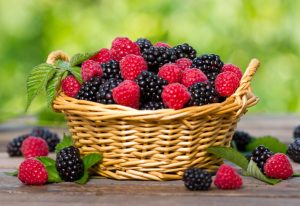
Some berry facts: A berry is classified as a fleshy fruit. It can contain one or many seeds. Berry-producing plants are called bacciferous. Berries are so common that you probably think you have a good grasp on them, but did you know that a strawberry, raspberry and boysenberry are not actually berries? It’s true!
Botanically speaking, a tomato is more so a berry than a strawberry, and a pomegranate is also more a berry than a raspberry. So although the word berry is in the name, it doesn’t always make it a true berry.
Here’s a list then of true berries that you should be eating daily for their health benefits.
Best berries for you
Goji berries: Goji berries contain many antioxidants which are beneficial to health as they can help fight against free-radical damage. They may also boost your immune system and promote eye health. Goji berries have been most commonly used in traditional Chinese medicine.
Goji berries contain fiber; they have no fat and are low in calories, so they make a great daily snack, especially for someone looking to lose weight. Unless you’re on blood thinners or diabetes medication, goji berries are safe to consume.
Harvard School of Public Health had women consume blueberries and strawberries and found a reduction in the risk of a heart attack by 32 percent. For best results, three servings a day is ideal.
Acai berries: Pronounced ah-sigh-EE, these berries resemble grapes. Most commonly grown in South America, acai berries contain antioxidants, vitamins A, B1, B2, B3, C and E, Omega-3, 6 and 9, calcium, iron, potassium, electrolytes and trace minerals. So as you can see, it’s no wonder these berries are highly beneficial for good health.
Antioxidants have also been shown to improve cognitive ability, as showcased by the Clinical Nutrition and Metabolic Care review in 2009. And if your interest is in cleansing the body to remove toxins, look no further than the acai berry as it can aid in that as well. Their fiber content can help with digestion and stiffen up stool for people who experience diarrhea. Further, they can keep you regular as well so the proper removal of waste can occur.
Other research, published in Nutritional Neuroscience, found that blackberries could help improve the motor skills which may deteriorate through aging. Researchers found that rats who had consumed blackberries for eight weeks had improved motor skills, including balance, motor performance and coordination.
Berry healthy recipes
Now that you’re aware of all berries health benefits, you’re ready to start incorporating berries into your diet! Here are some berry recipes which highlight berries health benefits.
Antioxidant powerhouse smoothie
Ingredients:
½ cup cubed frozen mango
1 cup frozen blueberries
1 ½ cup unsweetened coconut water
1 cup baby spinach leaves
1 Tablespoon lemon juice
¼ avocado
¼ teaspoon ground cayenne
1 tablespoon chia seeds
Blend all the ingredients together and serve. Makes one serving.
Mixed Berry Salad
By picking up some of your favorite varieties of berries, simply cut them up and mix them together for an antioxidant-rich berry salad.
As a dressing, combine balsamic vinegar and a small amount of sugar. Simply pour the dressing on top and let the berries soak it up.
Lastly, berries can simply be enjoyed on their own as well, so packing yourself a container of them before you head out can give you a boost throughout your day, along with the added benefits that come with their antioxidants. So if you’re looking for a sweet snack or fresh dessert with lots of variety, look no further than berries.
Related Reading:
Boost brain power, memory with antioxidants
The decline in brain function needed for everyday thinking, learning and memory is common as we age. But a new study suggests that nutrients high in antioxidants and other natural ingredients can help boost the speed at which the brains of older adults take in information.
Boost your immune system with the ‘mother of all antioxidants’
It’s the secret to treating everything from autism to Alzheimer’s disease, and warding off cancer, heart disease and dementia. But you likely don’t know much about it – if at all. The secret? Glutathione.